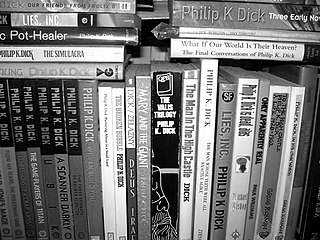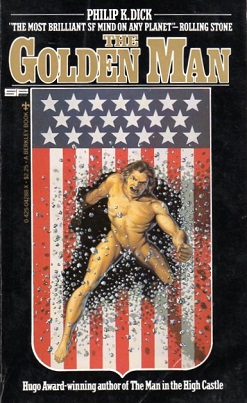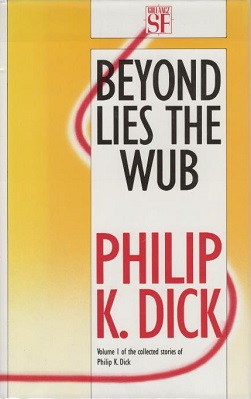Related Research Articles

Philip Kindred Dick, often referred to by his initials PKD, was an American science fiction writer. He wrote 44 novels and about 121 short stories, most of which appeared in science fiction magazines during his lifetime. His fiction explored varied philosophical and social questions such as the nature of reality, perception, human nature, and identity, and commonly featured characters struggling against elements such as alternate realities, illusory environments, monopolistic corporations, drug abuse, authoritarian governments, and altered states of consciousness. He is considered one of the most important figures in 20th century science fiction.
Radell Faraday Nelson was an American science fiction author and cartoonist most famous for his 1963 short story "Eight O'Clock in the Morning", which was later used by John Carpenter as the basis for his 1988 film They Live.
"Autofac" is a 1955 science fiction short story by American writer Philip K. Dick that features one of the earliest treatments of self-replicating machines. It appeared originally in Galaxy Science Fiction of November 1955, and was reprinted in several collections, including The Variable Man published in 1957, and Robots, Androids, and Mechanical Oddities published in 1984.
"The Father-Thing" is a 1954 science fiction short story by American writer Philip K. Dick. The story, told through third-person narration but focusing on the child, concerns the replacement of a boy's father with a replicated version. At first, only the child sees the difference and has to recruit other children to help him reveal the truth. The story is typical of Dick's short stories of the period.
"A Little Something for Us Tempunauts" is a science fiction short story by American writer Philip K. Dick. It was first published in the anthology Final Stage in 1974.
"The Exit Door Leads In" is a science fiction short story by American writer Philip K. Dick. First published in 1979.
"Roog" is a science fiction short story by American writer Philip K. Dick. It was his first sold work, although not his first published story.
Tim Pratt is an American science fiction and fantasy writer and poet. He won a Hugo Award in 2007 for his short story "Impossible Dreams". He has written over 20 books, including the Marla Mason series and several Pathfinder Tales novels. His writing has earned him nominations for Nebula, Mythopoeic, World Fantasy, and Bram Stoker awards and has been published in numerous markets, including Asimov's Science Fiction, Realms of Fantasy, Orson Scott Card's InterGalactic Medicine Show, and Strange Horizons.

The bibliography of Philip K. Dick includes 44 novels, 121 short stories, and 14 short story collections published by American science fiction author Philip K. Dick during his lifetime.

A Handful of Darkness is a collection of science fiction and fantasy stories by American writer Philip K. Dick. It was first published by Rich & Cowan in 1955 and was Dick's first hardcover book.

The Golden Man is a collection of science fiction stories by American writer Philip K. Dick. It was first published by Berkley Books in 1980. The stories had originally appeared in the magazines If, Galaxy Science Fiction, Beyond Fantasy Fiction, Worlds of Tomorrow, Science Fiction Stories, Orbit Science Fiction, Future, Amazing Stories and Fantasy and Science Fiction

The Collected Stories of Philip K. Dick is a collection of 118 science fiction stories by American writer Philip K. Dick. It was first published by Underwood-Miller in 1987 as a five volume set. See Philip K. Dick bibliography for information about the mass market reprints.

Beyond Lies the Wub is a collection of science fiction stories by American writer Philip K. Dick. It was first published by Gollancz in 1988 and later comprised Volume I of The Collected Stories of Philip K. Dick. Many of the stories had originally appeared in the magazines Fantasy and Science Fiction, Planet Stories, If, Galaxy Science Fiction, Imagination, Space Science Fiction, Fantastic Story Magazine, Amazing Stories, Future, Cosmos, Fantasy Fiction, Beyond Fantasy Fiction, Thrilling Wonder Stories, Startling Stories. The collection was reprinted by Citadel Press in 2003 under the title Paycheck and Other Classic Stories.

The Little Black Box is a collection of science fiction stories by American writer Philip K. Dick. It was first published by Gollancz in 1990 and reprints Volume V of The Collected Stories of Philip K. Dick. It had not previously been published as a stand-alone volume. Many of the stories had originally appeared in the magazines Worlds of Tomorrow, Galaxy Science Fiction, Amazing Stories, Fantasy and Science Fiction, Famous Science Fiction, Niekas, Rolling Stone College Papers, Interzone, Playboy, Omni and The Yuba City High Times.

The Short Happy Life of the Brown Oxford is a collection of science fiction stories by American writer Philip K. Dick. It was first published by Citadel Twilight in 1990 and reprints Volume I of The Collected Stories of Philip K. Dick. Many of the stories had originally appeared in the magazines Fantasy and Science Fiction, Planet Stories, If, Galaxy Science Fiction, Imagination, Space Science Fiction, Fantastic Story Magazine, Amazing Stories, Future, Cosmos, Fantasy Fiction, Beyond Fantasy Fiction, Thrilling Wonder Stories and Startling Stories. The collection was reprinted by Citadel Press in 2003 under the title Paycheck and Other Classic Stories.

The Eye of the Sibyl is a collection of science fiction stories by American writer Philip K. Dick. It was first published by Citadel Twilight in 1992 and reprints Volume V of The Collected Stories of Philip K. Dick, omitting the story "We Can Remember It for You Wholesale". Many of the stories had originally appeared in the magazines Worlds of Tomorrow, Galaxy Science Fiction, Amazing Stories, Fantasy and Science Fiction, Famous Science Fiction, Niekas, Rolling Stone College Papers, Interzone, Playboy, Omni and The Yuba City High Times.

Paycheck is a collection of science fiction stories by American writer Philip K. Dick. Although the collection appears with a 2003 copyright, it was first published by Gollancz in February, 2004. Many of the stories had originally appeared in the magazines Imagination, Startling Stories, Amazing Stories, Fantasy and Science Fiction and Galaxy Science Fiction.
"The Short Happy Life of the Brown Oxford" is a science fiction short story by American writer Philip K. Dick, first published in the January, 1954 edition of The Magazine of Fantasy & Science Fiction and later in Beyond Lies the Wub in 1984 and in The Short Happy Life of the Brown Oxford, a collection of Philip K. Dick short stories, in 1990.
"The Unreconstructed M" is a science fiction novelette by Philip K. Dick, first published in the January 1957 issue of Science Fiction Stories and later in The Minority Report. The story is in the public domain. In it, an independent researcher uncovers a plot to falsify evidence in a world where the technology used to solve crimes has advanced.
"The Hanging Stranger" is a science fiction short story by American writer Philip K. Dick, originally published in December 1953 in the magazine Science Fiction Adventures. It has been reprinted in several anthologies, and published in French, Italian and German. It was adapted by Dee Rees into the episode "Kill All Others" or "K.A.O." for the 2017 television series Philip K. Dick's Electric Dreams. A book was also released to republish "The Hanging Stranger" along with the nine other stories on which the Electric Dreams episodes were based.
References
- ↑ Dick, Philip K[indred] (1974). ""The Pre-Persons"". openpublishing.psu.edu. Retrieved 2024-01-04.
- ↑ "Phillip K. Dick's FORGOTTEN Pro-Life Short Story… "The Pre-Persons"". Cultural Revue. 2022-06-26. Retrieved 2024-01-04.